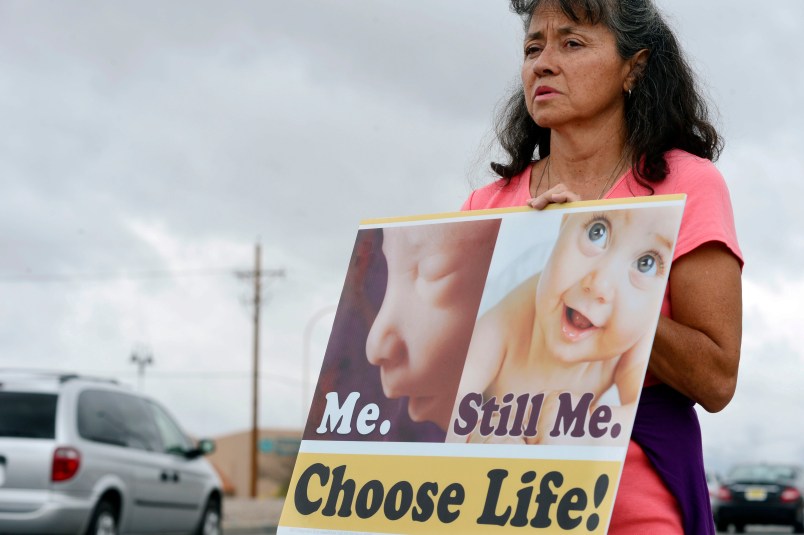It’s a strange feeling to have to walk past protestors to go to a party, but that was the case at a holiday party I went to last week for the DC Abortion Fund. Approximately a dozen protestors stood outside the venue, several holding full-color posters of what purported to be aborted fetal remains. (I say “purported” because the origin of some of these images has come under scrutiny in recent years.)
I don’t stop and talk to every person that protests outside an abortion clinic, let alone other places. But in this case, I was genuinely curious about what this group hoped to achieve. After all, they had to know that everyone attending this party was staunchly pro-choice. So did they really think that they were going to accomplish anything?
The protestor I spoke with thought abortion was so horrible that his morals impelled him—and presumably the other protestors—to show up. He seemed sincere about this, if overly reliant on anti-choice catchphrases. But it still seemed like a waste of time and energy to protest an event where you knew you wouldn’t change anyone’s mind. They weren’t offering assistance to women that might want to continue their pregnancies but not have the resources or support network to do so. They weren’t protesting to increase grants for medical research that could address terrible fetal abnormalities, or funding for programs that help children and support families. They were standing outside a holiday party for an all-volunteer organization so they could tell themselves they did something good by telling complete strangers that what they think and feel is wrong.
It’s their time and energy to waste, of course, but it’s a shame that they couldn’t cease with the rhetoric and have an actual conversation. Some of the most thought-provoking conversations I’ve had about reproductive rights have been with people whose beliefs are diametrically opposed to mine. Whether it’s in-laws, acquaintances, or strangers, the conversations have usually been polite and sincere, and they’ve given me greater insight into how certain views are formed. And that knowledge has helped better focus my own arguments and given me a much deeper understanding about why people are against abortion rights, contraception, and reproductive rights as a whole than I would have gotten just from my own environment.
Some time ago, during a talk I gave, a woman shared a moving story about her pregnancy. The fetus had a severe abnormality, but she chose to continue the pregnancy, even though the outcome was tragic. Her story has stayed with me in part because of the passionate way she told it, and in part because she knew I had a young child. She mentioned this not as an accusation, but in a way that made it plain she was speaking to me as one mother to another.
I told her I was sorry for her loss and glad she’d been able to make the choice that was best for her. Our conversation was brief and I wished that I could have talked with her longer. I had the feeling that she had thought very deeply about pregnancy and choice, and would have some interesting perspectives. But as soon as our conversation ended, one of her companions berated her for talking to me, much less politely.
Why? Because both women were part of Feminists for Life. I find this group incredibly problematic; I know feminists can be against abortion personally, but forming a group with the express purpose of telling, not asking, other women what choices they should make seems particularly anti-feminist. And I have no doubt that there are many other topics that this woman and I would disagree on, not just reproductive rights. But in a country where so many cultural, social and political debates seem to bring out the worst in people, and where our government seems perpetually bogged down by lawmakers who can’t see past their own self-interest, any willingness to discuss different viewpoints and perspectives is welcome.
But back to those protesters outside the DC Abortion Fund party. They had an impact too, albeit not the one they wanted. Their presence encouraged more donations to the organization—and more women being able to access the healthcare that they need.
Sarah Erdreich is the author of Generation Roe: Inside the Future of the Pro-Choice Movement. She lives with her family in Washington, D.C.







One thing I learned from the two women I know personally who’ve told me they’d had an abortion is that the experience was punishment enough. Between their internal guilt, external shaming, religious drama from their families, ridiculous hoops they had to jump through and the deterioration of their relationships with their boyfriends, I just don’t think the government has any more punishment to add.
I’m sure it’s no picnic, but I have to wonder how much of any guilt and self-examination is caused directly and indirectly by the ubiquity of anti-choice religious mumbo-jumbo as promulgated by fundies such as the Church and the jerks in the article protesting a holiday party. If we lived in a society where women were secure in the knowledge that they were in control of their own bodies, and that no one else claimed that control, I’d have to imagine that the decision to have an abortion or not could be approached in much less fraught way, with less post-op trauma, so to speak.
It seems to me that in the past 40 years we’ve gone backwards on this subject…which is the direction “conservatives” drag everything.
The three women I know closely who’ve had abortions: no huge deal, mostly because they were in family/life situations where they didn’t have to answer to some authoritarian head-of-family or culture. No fun at all, but in line with so many of things about life and having a body that are no fun at all. Guilt and shame didn’t really come into it.
That’s my (second hand) experience as well.